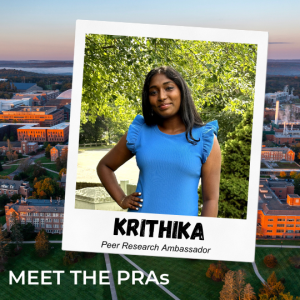Meet Krithika Santhanam ’25 an OUR Peer Research Ambassador double majoring in Molecular & Cell Biology and Individualized: Health Policy & Racial Disparities.
 What is the focus of your research?
What is the focus of your research?
The long bones of the adult arms and legs are originally completely made of cartilage. During embryonic development and adolescence, nearly all of the cartilage disappears and becomes replaced by bone through a process called endochondral ossification. The critical step of endochondral ossification is chondrocyte maturation; A stepwise differentiation program in which the chondrocytes that comprise the cartilage of the long bones proliferate, enlarge in size, and ultimately change into bone.
A key signal that promotes chondrocyte differentiation during maturation is the BMP (bone morphogenetic protein) pathway; A critical positive regulator of chondrocyte differentiation during maturation, however which individual BMP factor(s) mediate this role and their influence on promoting proliferation and/or stem cell behaviors are unknown. My project in the Dealy Lab aims to identify a new chondrocyte population that emerges below the growth plate and into the bone marrow space by using markers to identify their properties. My project provides insight into how understanding signals that control the balance of stemness and differentiation may help restore articular cartilage loss in adults by stimulating cartilage growth.
Aside from my work at UConn Health, I created a documentary project through the BOLD Women’s Leadership Network initiative where I was able to travel to Chennai, India and interview various advocacy initiatives to create awareness and a foundation on the experiences of individuals with disabilities with an Indian context.
This semester in the Showers lab, I will conduct interviews to examine the structural/systemic, institutional, and micro level factors that shaped the experiences of frontline and non-frontline health care workers during the various waves of the COVID-19 pandemic.
Why did you get involved in research?
In all honesty, I got involved in research because it was something I saw high-achieving individuals pursing around me. As a freshman, I wondered if I would be able to write a research proposal, present at a conference, and go through the experimental design process. I wanted to engage in this process to learn more about myself and try something new. Once I found a project I was passionate about, digging deeper into my work came naturally and going through difficult processes like applying for SURF and BOLD, creating a poster, and presenting in-front of large crowds allowed me to grow valuable skills of presentation, communication, and collaboration which is what I hoped for when stepping foot into the world of research and creative activity.
What advice would you give to aspiring student researchers?
My advice to aspiring student researchers is to be open-minded when exploring different types of research at UConn. Not all research students pursue is wet lab experience involving pipetting solutions at a lab bench and there is no one “correct” type of research to help you in your future career goals. Research is not something to check off your list as an extracurricular experience. Rather, it is a chance to explore a discipline that excites you and develop transferable skills for to help you reach your goals. The proactive process to find research can be overwhelming at times however, the experience you engage in at the end of the process is truly rewarding, hang in there:)
What is your greatest accomplishment so far?
I think my greatest accomplishment so far has been bringing the idea I had for my BOLD project to life. Although I doubted myself at times that I could make the connections and plan out the interviews, it was amazing to see the product come together and is something I am truly proud of. I hope the foundation that the documentary provides uplifts and supports a community that deserves to be recognized and allows others to learn their experiences, challenges, and successes.
What are your plans after graduation? How has involvement in research influenced your plans and prepared you for the future?
My enthusiasm for pursuing a career in clinical practice stems from my goal to diversify my interactions with people from different backgrounds and cultural experiences. Therefore, I want to engage in different communities where curiosity and courage to pursue the unknown is valued. Leading a research project in the Dealy Laboratory allowed to me to do just that. Dr. Dealy encourages the development of transferable skills, continuous reading of scientific literature, and public presentation of research to different audiences, all which develop my interpersonal skills as a pre-medical student. Creating abstracts, summary outcomes, and writing for grant funding improves my knowledge of the scientific writing process. In the future, I hope to go to medical school and continue to develop my ways of thinking, collaborating, and leading to achieve my optimal goal of patient advocacy, which I believe will benefit from the communication and problem-solving skills I have learned and continue to learn throughout my research journey.
Click here for more information on Krithika and other OUR Peer Research Ambassadors.